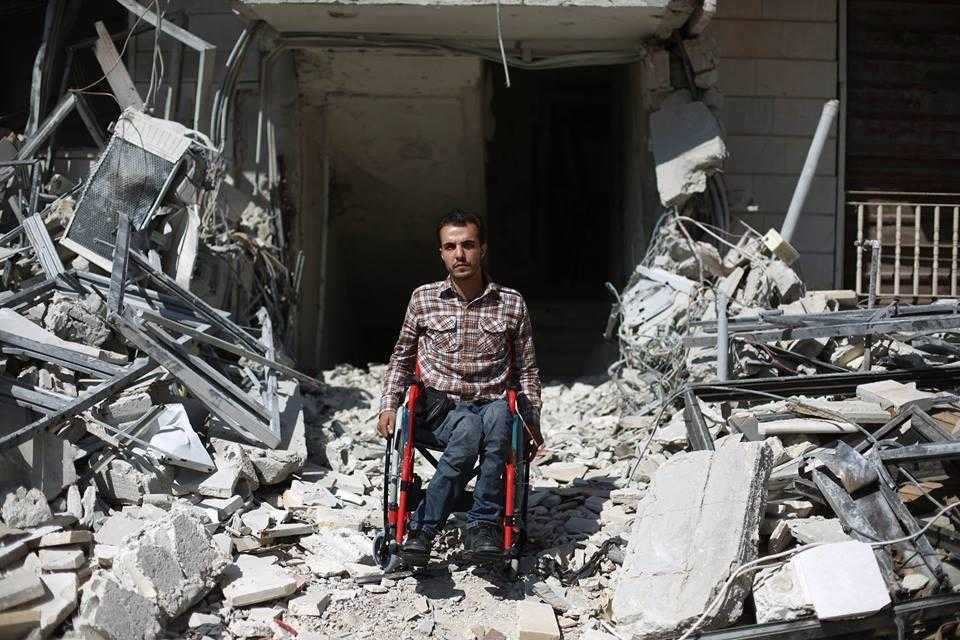Paralyzed East Ghouta residents left with ’emotional and physical void’ after airstrikes destroy rehabilitation center
When a suspected Russian or regime airstrike hit the only […]
4 October 2017
When a suspected Russian or regime airstrike hit the only physical rehabilitation center for spinal cord injuries in the rebel-held East Ghouta suburbs of Damascus last week, Abu Zeid, a patient at the center, had no choice but to stay put.
The 24-year-old resident of the besieged enclave’s de facto capital, Douma, suffers from paraplegia, or paralysis of the lower limbs, a permanent injury caused by the bombing of his home in 2015.
As dust filled the rehab center on September 26, Abu Zeid tells Syria Direct’s Bahira al-Zarier that he and more than a dozen others with partial or complete paralysis were trapped.
“We couldn’t help each other or flee,” he says, “we’re all disabled.”
A second strike hit about eight minutes after the first, while Civil Defense forces tried to evacuate the building, and a third came about eight minutes after the second, the center’s director, Khaled al-Hallaj, told Syria Direct on Wednesday.
In the wake of the strikes, three were dead—two patients and a staff member—and the rehabilitation center was damaged beyond repair, al-Hallaj said.

Abu Zeid escaped with fractures and bruises. He spoke to Syria Direct from a local hospital where he is still recovering.
The center’s director, al-Hallaj, is now searching for a secure location to rebuild. Founded last year, the center is funded by local organizations, donors and in part by the Syrian American Medical Society (SAMS), which reported the attack.
Until then, Abu Zeid says he and about 20 fellow patients have lost not only access to critical treatment but also an array of courses and activities that helped them overcome the challenges of day-to-day life with paralysis.
“The center was, for us, a ray of hope,” he says.
Q: Could you describe the attack on the center?
On Tuesday afternoon [September 26], warplanes bombed the center while I was inside. It was the first time that it has been hit. All of us were busy in the center when it happened—both staff and patients with partial or complete paralysis.
When the bombing happened, I truly felt my disability. I couldn’t do anything. After the first strike, there was just fear, and when the second strike came people were killed and injured. We were all confused and terrified. We couldn’t help each other or flee. We’re all disabled. We couldn’t even see the room around us because of the dust and destruction that filled the center.
Q: What services were you receiving at the center?
After I was injured [in 2015], I went to the center for physical therapy. Then, I started to attend every day to participate in the activities offered to those with disabilities—such as language courses—as well as the physical [therapy] exercises.
The center was, for us, a ray of hope that made us overcome our disabilities through the courses and activities offered there.
I learned how to balance [myself] and then began to train others to do the same, despite my disability. It became like a job for me, and I became someone with something to offer. I felt proactive.
Q: What ongoing challenges are you facing as a result of your paralysis?
In my day-to-day life, I need someone to tend to me and assist me with normal needs, like eating, drinking, dressing and cleaning, due to my disability.
A patient amidst the damage to the center on Tuesday. Photo courtesy of Douma Revolution.
I even needed help from someone else to leave the center [before it was bombed], something that would be very simple for anyone who isn’t disabled.
Any request, no matter how easy for an average person, is very difficult for me.
People in the community view me with pity. This makes it difficult for me to ask for help, especially since I’m young. I need assistance, but I still feel upset and helpless when someone offers.
Q: What does the center’s closure mean for you and the other patients?
My family left the country before I was injured, so I [began to] live at the center. It provided me with services as if I were in my own home.
[Ed.: Director Khalad al-Hallaj explained that the center does not usually host residential patients, but that Abu Zeid’s case was considered exceptional since his family lives abroad.]Now that the center has been bombed, an emotional and physical void is left. The center was the only place that welcomed us, and now it’s gone. I have no family and no home to return to. The center was my home.
After we were disabled, after Assad and the war deprived us of our lower limbs, after we grew accustomed to our reality and overcame our disabilities, the bombing returned again to rob us of the center.
There is no safe place in Syria. The bombing does not discriminate.








